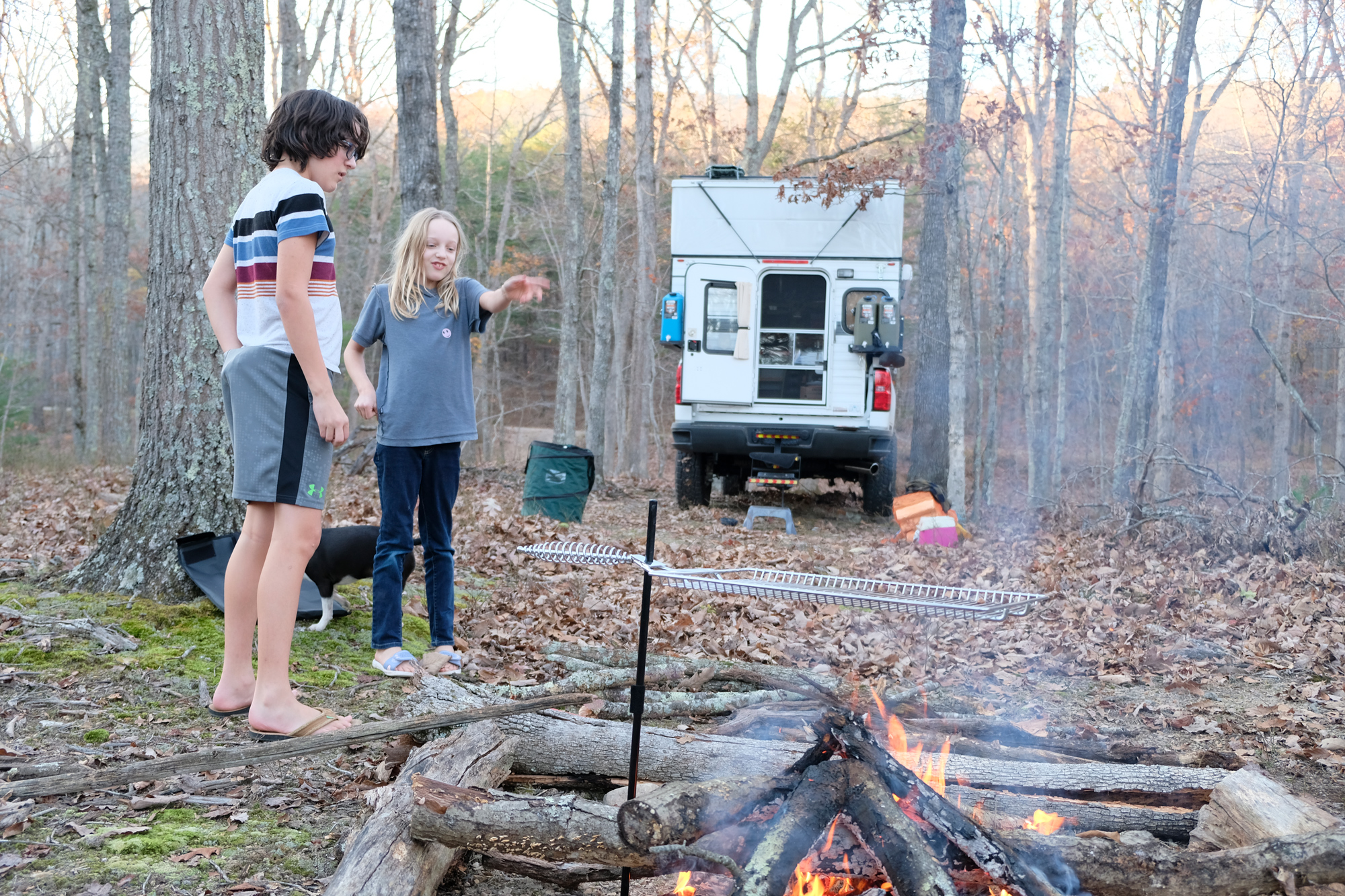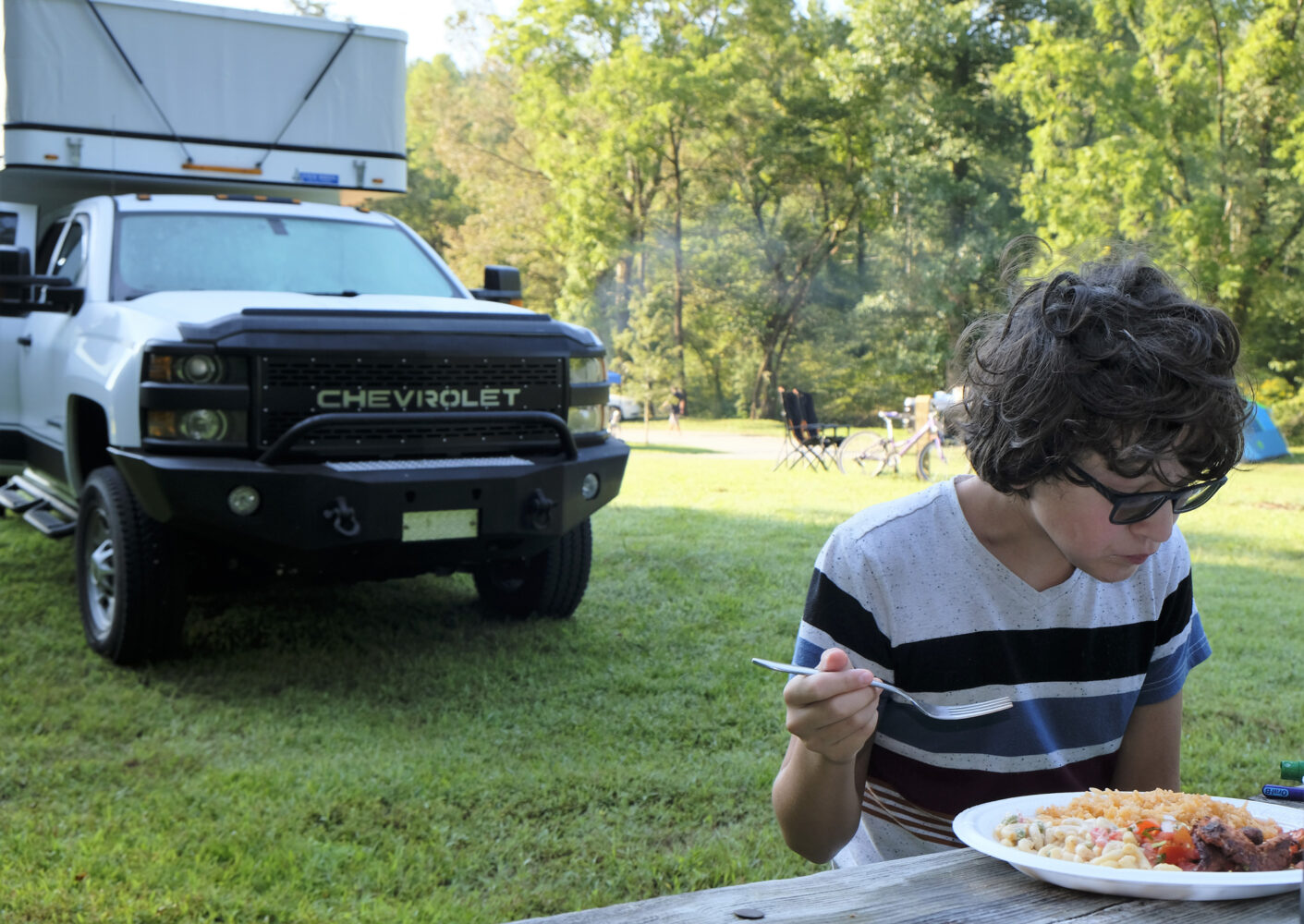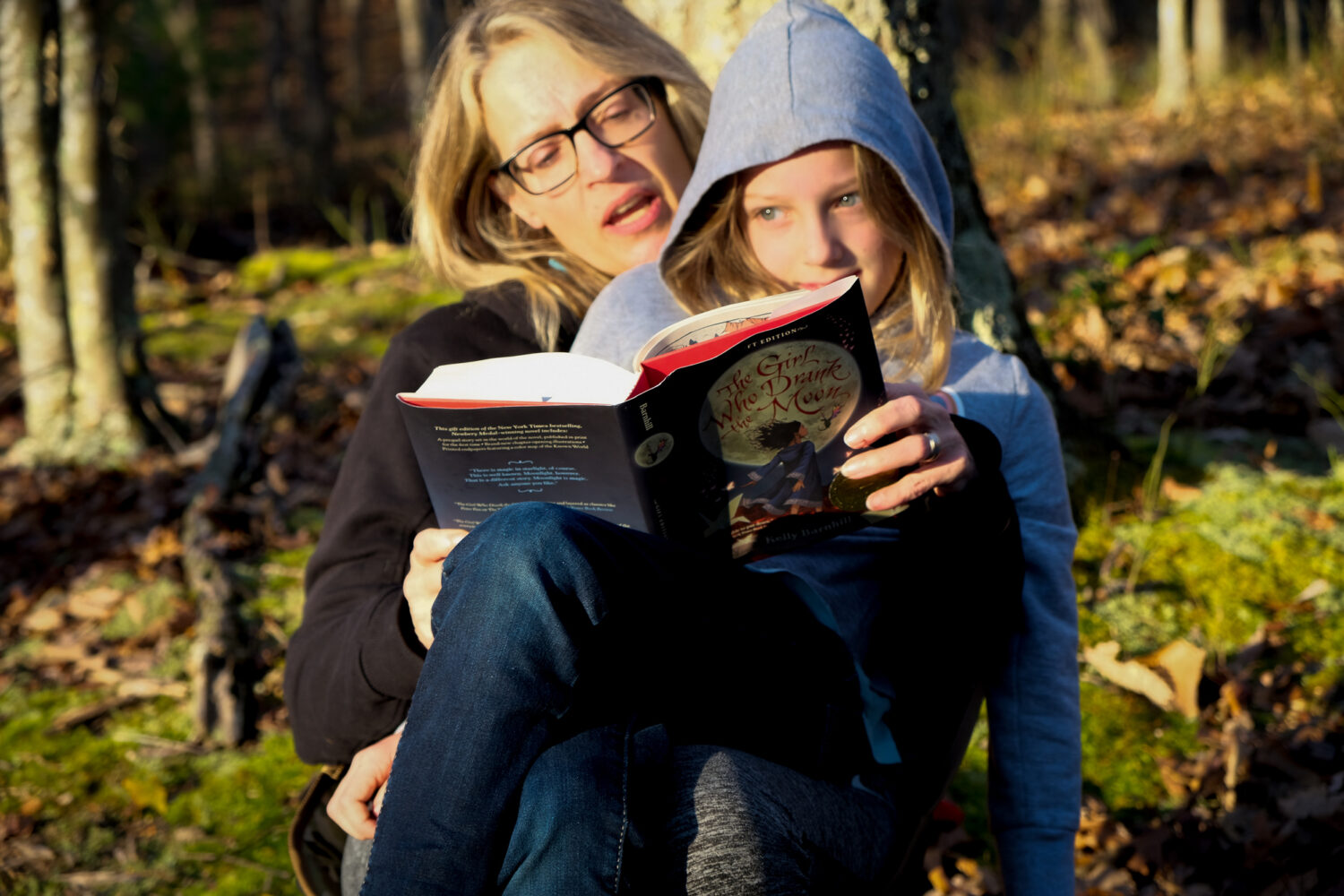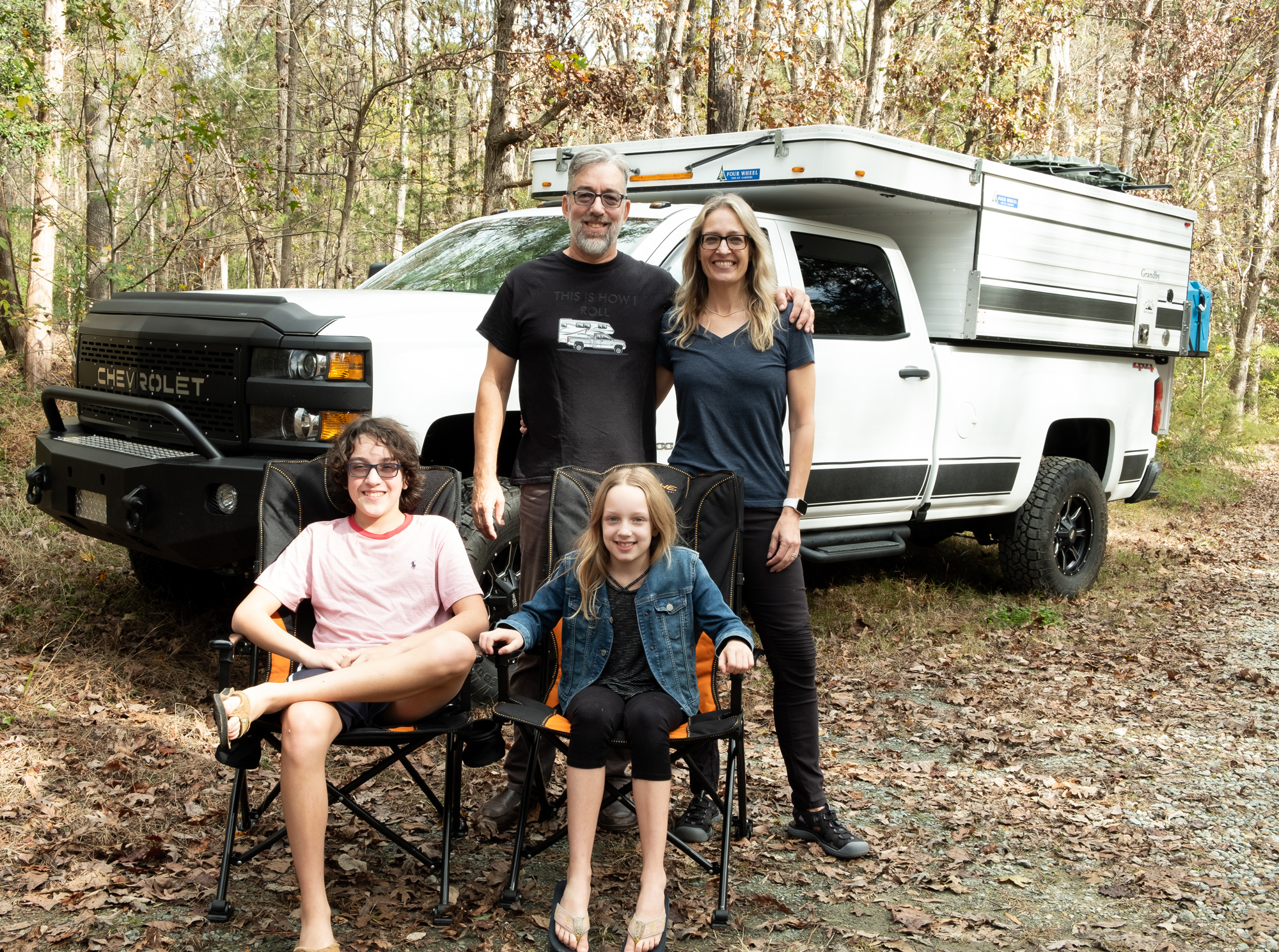For all the usual reasons—long work hours, lack of time together, a love of the open road—our family plans to overland for a full year, from Canada to Panama, starting this summer, if the pandemic permits. Our kids take issue with this plan.
Both enjoy weekend trips into the wild but are not sold on a full year. Their lives are already packed with adventure. School is a rollercoaster of discovery. Oliver, who is 13, knows how to set up a tent, inflate tires, catch fish, and wield an ax. But he also enjoys gaming, skating, and card exchanges with his neighborhood friends. His biggest fear is losing touch with his social circle and landing up persona non grata. Perry, our 9-year old, has all the makings of a good overlander. She is tough, independent, and curious about everything. She wants to see wolves in the wild and likes the idea of not showering every day, which she describes as “sooo time-consuming.” Her fears include bears and whale watching (“terrifying”), the small amount of space she has in the rig (“I would prefer to live in a mansion”), no TV, leaving our dog in someone else’s care, nightmares, and car crashes.

These perfectly legitimate concerns fuel our children’s grievances with our overall plan. Why do we have to go? Why does it have to be a whole year? Why can’t it be for a couple of weeks, like normal people?
There are three parent types that will dictate how you deal with such questions from your kids, whether your overlanding plans involve an entire year or just weekends away. Each has implications for the likely success of our adventures.
The Authoritarian or “Overlord” Parent
Overlords are absolute, supreme rulers. They brook no opposition, no complaints, no dissent. In overlanding, this approach will steer you to simply ignore or silence the kid who dares to question the parental decision to go overlanding. The Overlord may listen once or twice to their child’s objections and respond, “Well, honey, we are going, and we are going for a year, and, trust me, you will enjoy it.” Subsequent attempts to bring the same objections to bear, whether or not accompanied by a flood of tears, will be summarily shut down. “We’ve talked about this before, and my answer hasn’t changed. So GET A GRIP!”

The Overlord strives for emotional suppression. S/he figures that the less voice children are given, the less unsettled and unhappy they will be. Peace will reign. This is faulty logic and dials up the potential for pent-up unhappiness and conflict to surface later, marring the overlanding experience. The Overlord approach is also likely to backfire when the overlanding unit is truly under stress in the case of 12-hour drives, a breakdown, or an accident, where parents need their kids to step up with initiative, cooperation, and trust. It’s not the parenting style for us.
The Permissive or “Pushover” Parent
Pushover parents sit on the other end of the spectrum and are in for a hell of a ride. It’s the parenting style Oliver and Perry most wish for, giving them maximum voice and veto power. To stay true to this approach, we would need to delay our travel plans until the kids are out of the house and in college, when “you old guys can rent a nice RV and putter around the country by yourselves.” It would require that we put a TV into the rig, skip that once-in-a-lifetime hike up to Tajumulco’s volcano in Guatemala, and ditch delicious huevos motulenos in rural Yucatan for burgers and shakes at McDonald’s in Mexico City.

We are not opposed to these alternatives, on occasion. We like to give our kids some say in our choice of activities. But if their likes and dislikes dictate that we miss out on authentic local and regional experiences, then the whole point of the trip is undermined. The Pushover approach, in other words, is not the parenting style that meshes best with our vision of family overlanding.
The Assentive Parent or “Kindly King”
Many people are familiar with the concept of “consent.” Consent to kiss someone you met in a bar. Consent to be included in a subscription service. Assent is a related but lesser-known idea. In medical care, assent means you can actively agree to a type of treatment, such as chemotherapy, but you cannot back out. Doctors usually reserve assent for sick minors, the goal being that, with an informative and gentle touch, patients actively agree to a treatment they really need and will benefit from, rather than reject it or go into it negatively and mistrustfully. The goal of the assentive process—and it is a process—is to build trust, cooperation, and positivity between doctors and young patients.
The same can be said for the Kindly-King approach to overlanding. In this approach, parents are the primary decision maker, but, unlike the Overlord, they work hard at being compassionate and gentle in communicating and executing their decisions. For example, instead of curtly informing kids they will be going overlanding and will have fun, the Kindly King takes time to explain what overlanding is and why it is a healthy corrective to everyday routines, laptops, and insular living. Kindly Kings gently make it clear that the decision to go overlanding is non-negotiable (rare situations, though, may call for a change of plans, for example, where a child becomes severely withdrawn or clinically depressed over the prospect of leaving home. Yet, even here, it should be a parental and possibly professional evaluation of a child’s best interests that matters most, and not only the child’s opinion). Unlike Overlords, Kindly-King parents encourage their kids to be active participants in the planning stages of a trip, decisions about activities and accommodations, and the trip itself. This may not be easy, but it is worth it.

Whereas the Overlord is isolated and alone on his journeys with his fearful, passive minions and the Pushover parent is strapped in with shrieking back-seat drivers, unable to focus and enjoy the trip, the Kindly King has a better chance at a rich overlanding experience with respectful, engaged, and active companions.
We do our best to model a Kindly King with Oliver and Perry. We are not always successful. The urge to be an Overlord or Pushover parent is strong. The main short-term benefit of these approaches—that delicious artificial peace—is tempting. But we also know from our past experiences that you get out of family overlanding what you put into it by way of relationship building, compromise, and trust. So we have tried our best to plan for our next major trip by encouraging discussion on the following points.
- Making it clear to Oliver and Perry that going on the trip is not negotiable but that we will do what we can to make it enjoyable and interesting for them.
- Giving them both space at the dinner table, in the car, or when we are with friends or family to ask questions and share concerns if the topic of overlanding comes up.
- Avoid promises or reassurances we cannot guarantee (“everything will be great; you will enjoy yourself”).
- Balance the positive with the negative, e.g., we will see and do plenty of wonderful things, but things will sometimes get tough.
- Get both kids involved in trip planning by inviting reasonable suggestions in regard to destinations, accommodations, food, activities, etc., and point out when their suggestions are unreasonable (e.g., McDonald’s instead of Yucatan) and why (the goal is to get us out of our comfort zone and experience new things).
- Take practical steps to address their most valid concerns, for example, investing in a web-signal booster and seeking out places with internet so Oliver can continue his weekly online meet-up with friends. Or taking a ranger class on bears and bear safety to allay one of Perry’s fears—and better prepare the whole family for an unwanted encounter.

It’s been two years since we informed the kids of our next big overlanding trip. We were supposed to roll out in 2020, but Covid changed that. Actually, Covid has helped. The kids have adapted to isolation, virtual school, not seeing friends in person. Some of their fears have dissipated. Others remain, and we try to acknowledge those. Both kids talk openly with friends and family about our plans to “overland,” a term they use with a noticeable touch of pride. To us, that bodes well. After all, our trip is intended to enrich our whole family, not just its Kindly Kings.
Our No Compromise Clause: We carefully screen all contributors to make sure they are independent and impartial. We never have and never will accept advertorial, and we do not allow advertising to influence our product or destination reviews.


